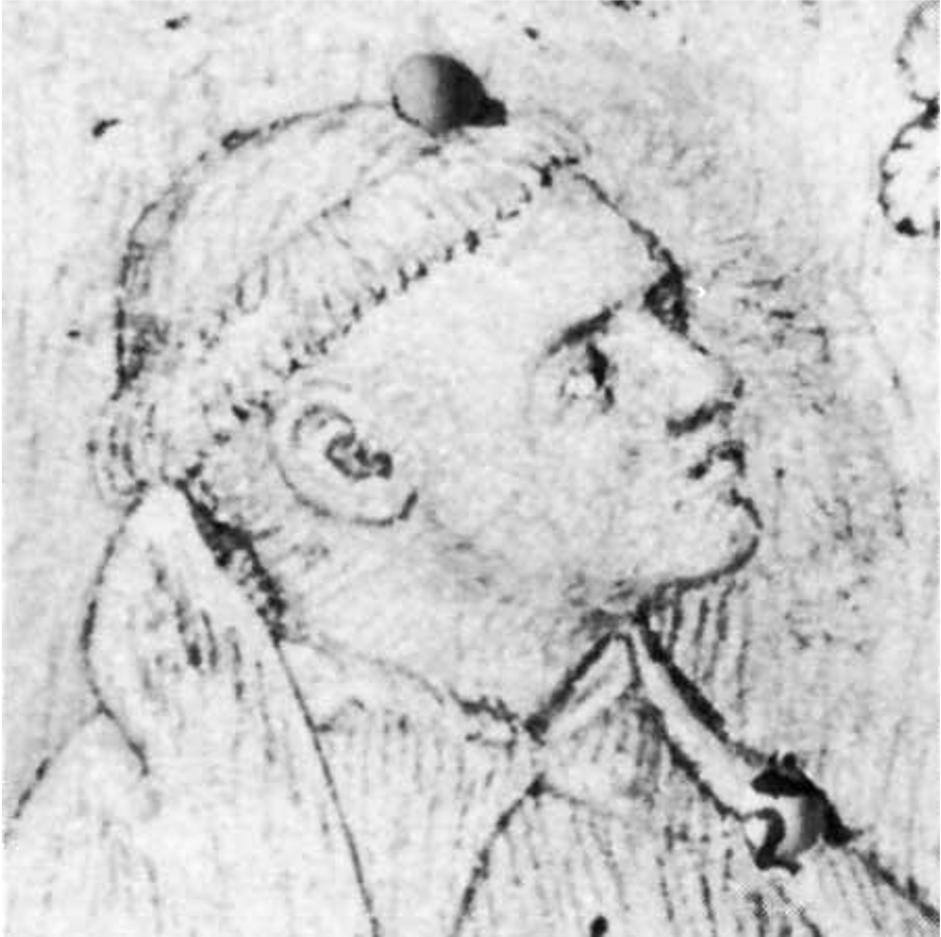
One of the earliest mentions of Valentine’s Day in English literature comes in the form of a poem by John Lydgate. Lydgate was a 15th century poet and monk who was both prolific and popular in his own time. He had many noble patrons, most notably Henry V, Henry VI, and Humphrey of Gloucester. Though there are earlier literary references to Valentine’s Day – most notably by Geoffrey Chaucer in his ‘Parliament of Fowls’ – I wanted to discuss this poem, usually referred to as ‘A Valentine to hir þat excelleþe All,’ because of the reputation it has gained.
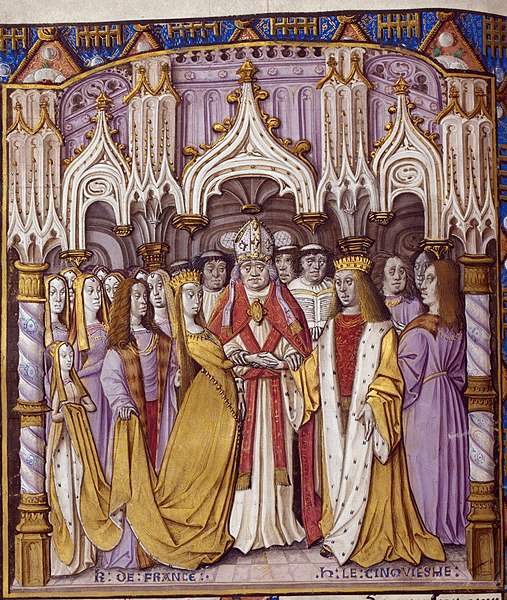
Every year on Valentine’s Day, blogs and Facebook pages will discuss the history of the day. One of the ideas that is often repeated is that Lydgate was commissioned to write a Valentine for Henry V to his wife, Catherine of Valois. Their marriage took place in 1420, but ended tragically just two years later with Henry V’s death on the 31st August, 1422. Some articles just say that it is believed that at some point during their brief marriage Lydgate wrote a Valentine’s note on Henry’s behalf, with the implication that it has been lost to time; whilst others will name the poem ‘A Valentine to her that Excelleth All’ as the work in question. Usually in these cases, only the first stanza is provided:
~
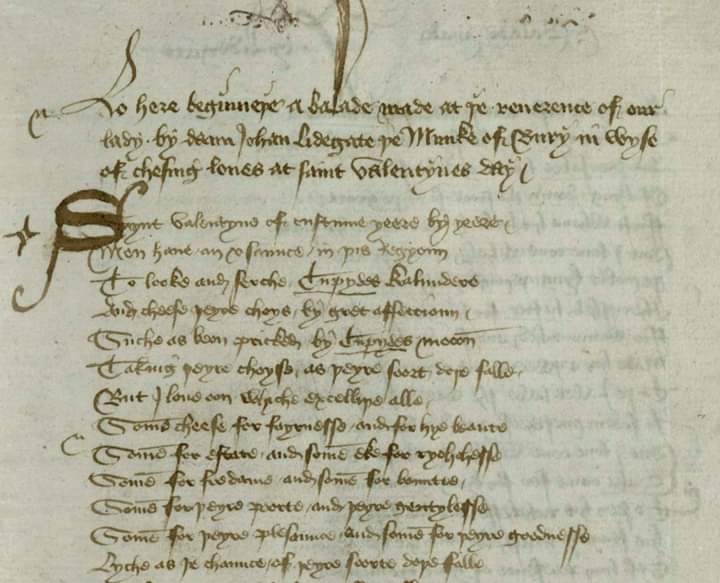
‘Saynt Yalentyne, of custume yeere by yeere,
Men haue an vsavnce in þis Regyoun
To looke and serche Cupydes Kalundere,
And cheese þeyre choys by gret affeccioun ; —
Suche as beon pricked by Cupydes mocion,
Taking þeyre choyse, as þeyre soort doþe falle
But I loue oon whiche excelliþe alle.’
~
Unfortunately, few bother to read the full poem; if they did it would be clear that it is impossible for this poem to have been written on Henry V’s behalf. The final stanza of the poem reads:
‘With humble herte beseching þat virgyne,
Whiche is moost feyre, moost bountevous and goode,
To sixst Henry, his moder Kateryne,
To sheede hir grace, and to þeyre noble bloode ;
And Cryst Iesu, þat starf vpon þe Roode,
Haue on vs mercy, whane we for help calle,
For love of hir, þat excelleþe alle!’
The first line makes it clear that the poem is actually a religious tribute, dedicated to the Virgin Mary, who was considered the epitome of womanhood during this period, rather than a romantic gesture between the royal couple. And more importantly, these lines make it clear that it was written during Henry VI’s reign, ergo, after Henry V’s 1422 death.
Though we don’t have a precise date for when the poem was written, given the dedication to Catherine it would have been written before her scandalous affair and marriage to Owen Tudor became widely known; therefore, we can tentatively date it to some time between Henry V’s 1422 death, and the birth of Catherine and Owen’s first child, Edmund, in 1430.
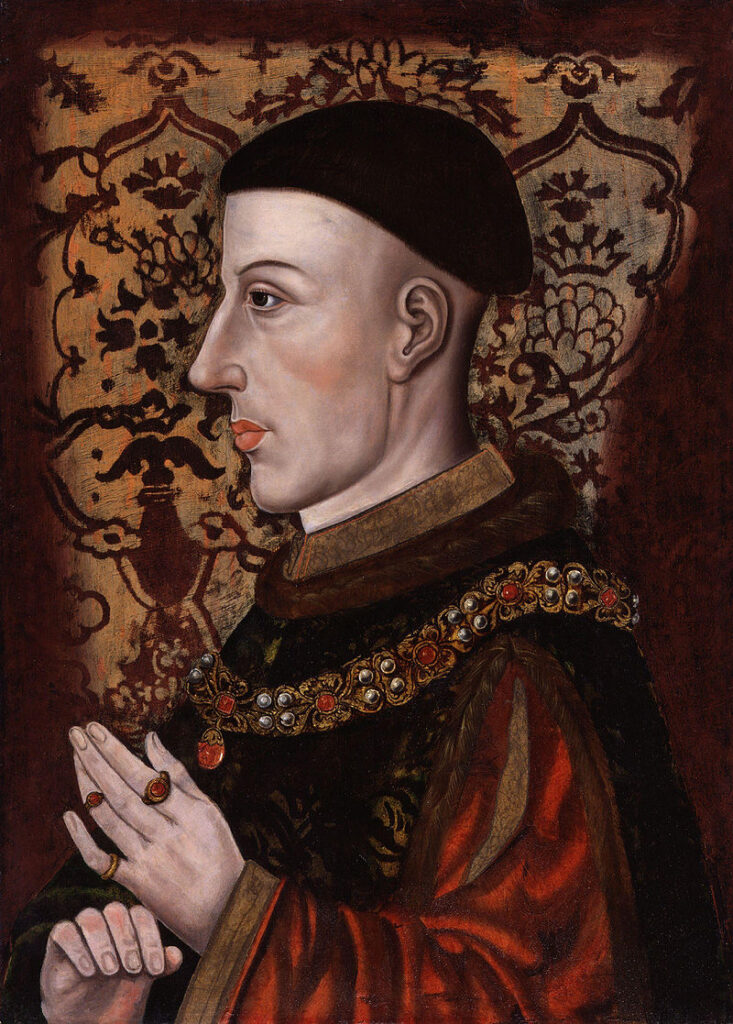
So if this poem wasn’t commissioned by Henry V for his wife, was there ever such a letter or poem created? None of the articles that say the note did exist but has been lost provide a source for their information. I have found no evidence to suggest that Henry V did commission Lydgate, or anyone else for that matter, to write a Valentine poem or letter to Catherine. I believe that this is one of those historical rumours that is based on a single misinterpretation, but has taken on a life of its own. This is not uncommon in historical scholarship; I have written posts on such errors in scholarship on Richard the Lionheart and Richard III, which you can read here: https://tinyurl.com/ycvjptxu ; and here: https://tinyurl.com/2p9xyk6j , respectively.
This is still a beautiful Valentine’s Day poem, even if it wasn’t written on Henry V’s instruction. Lydgate compares his beloved favourably to many great, renowned women from Antiquity and the Bible, with each verse ending with a variation of the refrain ‘But I loue oone þat excelleþe alle.’ The comparisons and the reference to ‘Seynt Valentine’ leads the reader to believe that the narrator is speaking of his lover in the first half of the poem; it isn’t until stanza 11 that he reveals the subject of his love ‘And if I shal hir name specyfye…called is Marye.’
~
A VALENTINE TO HIR þAT EXCELLEþE ALL
Saynt Yalentyne, of custume yeere by yeere,
Men haue an vsavnce in þis Regyoun
To looke and serche Cupydes Kalundere,
And cheese þeyre choys by gret affeccioun ; —
Suche as beon pricked by Cupydes mocion,
Taking þeyre choyse, as þeyre soort doþe falle
But I loue oon whiche excelliþe alle.
~
Some cheese for fayrnesse and for hye beaute,
Some for estate, and some eke for rychchesse,
Some for fredame, and some for bountee,
Some for þeyre poorte and þeyr gentylesse,
Some for þeyre plesaunce and some for þeyre goodnesse,
Lyche as þe chaunce of þeyre soorte doþ falle,
But I love oone whiche excelleþe alle.
~
I chase þat floure siþen goon ful yoore,
And euery yeere my choyse I shal renuwe,
Vpon þis day conferme it euermore,
Sheo is in loue so stedfast and so truwe ;
Who loueþe hir best, hit shal him neuer ruwe,
Yif such a grace vn-to his soort may falle,
Whame I have chose for she excelleþe alle.
~
Men speke of Lucresse þat was of Roome tovne,
ffor wyvely trouth founded on clennesse,
Some wryte als of Marcea Catoun
With laude and prys for hir stedfastnesse ;
And some of Dydo for hir kyndenesse,
(ffortune suche happe leet vpon hem falle)
But I loue oone þat excelleþe alle
~
Rachel was feyre, Lia was eke fecounde,
And ryche also was þe qweene Candace,
So in hir tyme Right fayre was Roosamounde,
And Bersabee hade a goodely face,
Of Kyng Dauid she stoode so in þe grace,
ffirst whane his look he leet vpon hir falle,
But I loue oone whiche excelleþe alle.
~
þe noble kyng, þe mighty Assuere,
Cherisshed Hester for hir gret meeknesse,
ffor wommanhed, and for hir humble chere,
Made hir a qweene, and a gret Pryncesse ;
To þe Juwes lawe she was defenseresse,
In sodein mescheef þat did vpon hem falle,
But I loue oon whiche excelleþe alle.
~
Saba came fer for kyng Salamon
To seen his richchesse and his sapience,
His staately liousholde, and his hye Renoun,
Gaf him presence of gret excellence,
Herde his proverbes and his gret prudence,
Where as he seet in his royal stalle,
But I loue oone, þat excelleþe alle.
~
What, shal I seyne of qweene Penolope?
Or in Grece of þe qweene Alceste?
Of Polixeene oþer of Medee?
Or of qweene Heleyne holden þe fayrest
Lat hem farewell! and let her names rest!
My ladyes name feyre renoun dooþe appalle,
Whome I haue chose for she excellþe alle
~
Tesbe þe mayde borne in Babyloun
þat loued so weel þe yonge Pyramus,
And Clopatre of wilful mocyoun
List for to dye with hir Antonyus.
Sette al on syde oone is so vertuous
Whiche þat I do my souerein lady calle,
Whame I loue best for she excelleþe alle.
~
Gresylde whylome bade gret pacyence,
As hit was preued fer vp in Itayle,
Pallas Mynerua haden eloquence,
And Pantasilia faught in plate and mayle,
And Senobya lyouns wolde assayle,
To make hem taame as Oxe is in a stalle,
But I love oone, þat excelleþe alle
~
And if I shal hir name specyfye,
þat folk may wit whiche shee sholde be,
þis goodely fresshe called is Marye,
A braunche of kynges, þat sprange out of Iesse,
þat made þe lord thorughe hir humylyte
To let his golddewe in-to hir brest dovne falle,
To bere þe fruyt which should saue vs alle
~
I mene þus, whane þe Holy Goost alight
In-to hir brest, to saue vs euerych oone
Right as þe dewe, with siluer dropes bright,
ffell vpon þe flees of Gedeoun,
And as þe yerde also of Aaroun
Bourjourned, and bare fruyt to sugre oure galle,
Whome I loue best, for sheo excelleþe alle.
~
Sheo of oure yvel adawed haþe þe clippes,
Oure victorye of þe serpent wonne,
þis is sheo, þat whylome in þapocolippes
Saint Iohan þapostel sawe clopþd in sonne ;
Mankyndes Ioye at hir was first begonne,
Refuyt to synners þat for help do calle
To hir of goodnesse, whiche excelleþe alle.
~
þis is þe mayde, whiche on þawtere,
With chylde in armys appeered pleynly þanne,
And shoone for brightnesse as any sonne cleere,
To-fore þemperour cleped Octonyan
And he felle doune and worship hir began,
Lefft his pryde and gan hir socour calle,
To hir of goodenesse, þat excelleþe alle.
~
If Sheo was cheef roote of oure saluacyoun,
þat first for man þe helthe gan pourchace,
Whane Gabryell with salutacyoun,
Gane frome þe lord hir salue in þe place,
Sheo brought first Theofilus to grace,
Out of þe mescheef þat he was Inne falle,
Whanae I loue best, for sheo excelleþe alle
~
Men at þeyre lust may booþe cheese and leet,
Lyche as love dooþe þeyre hertes distreyne,
Kateryne was goode and sainte Margarete,
Agnes Agas and Marye Magdaleene,
Fydes Lucya and also sainte Eleyne,
But of my soort þe soort is so befalle,
I loue oon best, for sheo excelleþe alle.
~
Affter þeyre hertes to euery man is free,
Who euer sey nay, in loue for to cheese ;
In choys of love þer is gret libertee
Euery sesoun, wheþer hit thowe or freese ;
And for my part, by cause me list not leese,
Ne in my choyse þer may no meschief falle,
I haue choose oon which þat excelleþe alle.
~
Frorne yeere to yeer for necglygence or rape,
Voyde of al chaunge and of nufanglenesse,
Saint Valentyne hit shal me not escape
Vpon þy day, in token of stedfastnesse,
But þat I shal conferme in sikurnesse
My choys of nuwe, so as it is befalle,
To love hir best, whiche þat excelleþe alle.
~
Noble pryncesse, braunche of flour delys,
Whas goodenesse thoroughe þe worlde dooþ shyne,
So weel avysed, so prudent, and so wys,
Saint Clottis blood, and of þat noble lyne!
Lowly beseeche I, conferme and termyne
To yif me love, lyche as it is befalle,
To love hir best þat excelleþe alle.
~
With humble herte beseching þat virgyne,
Whiche is moost feyre, moost bountevous and goode,
To sixst Henry, his moder Kateryne,
To sheede hir grace, and to þeyre noble bloode ;
And Cryst Iesu, þat starf vpon þe Roode,
Haue on vs mercy, whane we for help calle,
For love of hir, þat excelleþe alle!
~
Top images:
Detail of a miniature of Henry V of England when he was Prince of Wales, by an unknown artist, from Thomas Hoccleve, ‘Regement of Princes,’ Arundel 38, f. 37 (left);
Detail of an illustration of the wedding of Catherine of Valois and Henry V, from the late 15th century “Beauchamp Pageants”.

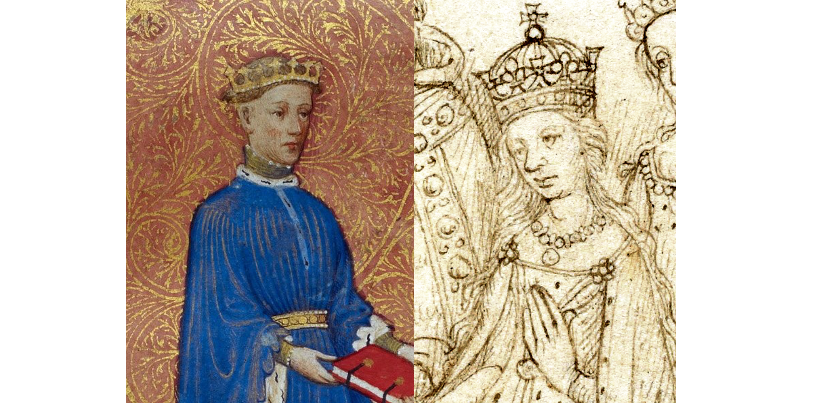
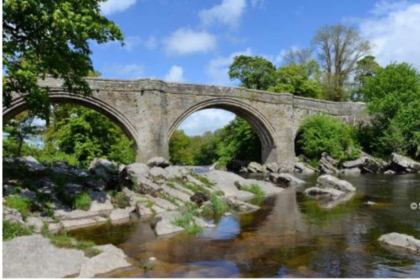

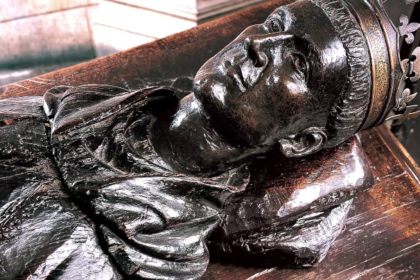
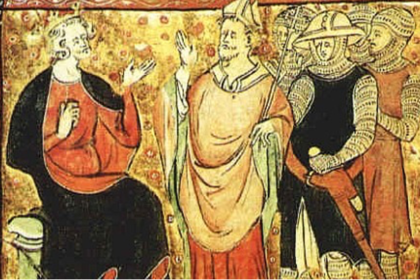
[…] who was also the author of the Valentine poem I wrote about in February, which you can read here.John Lydgate grew up in Lidgate, which is probably what his surname derived from. In his youth, […]